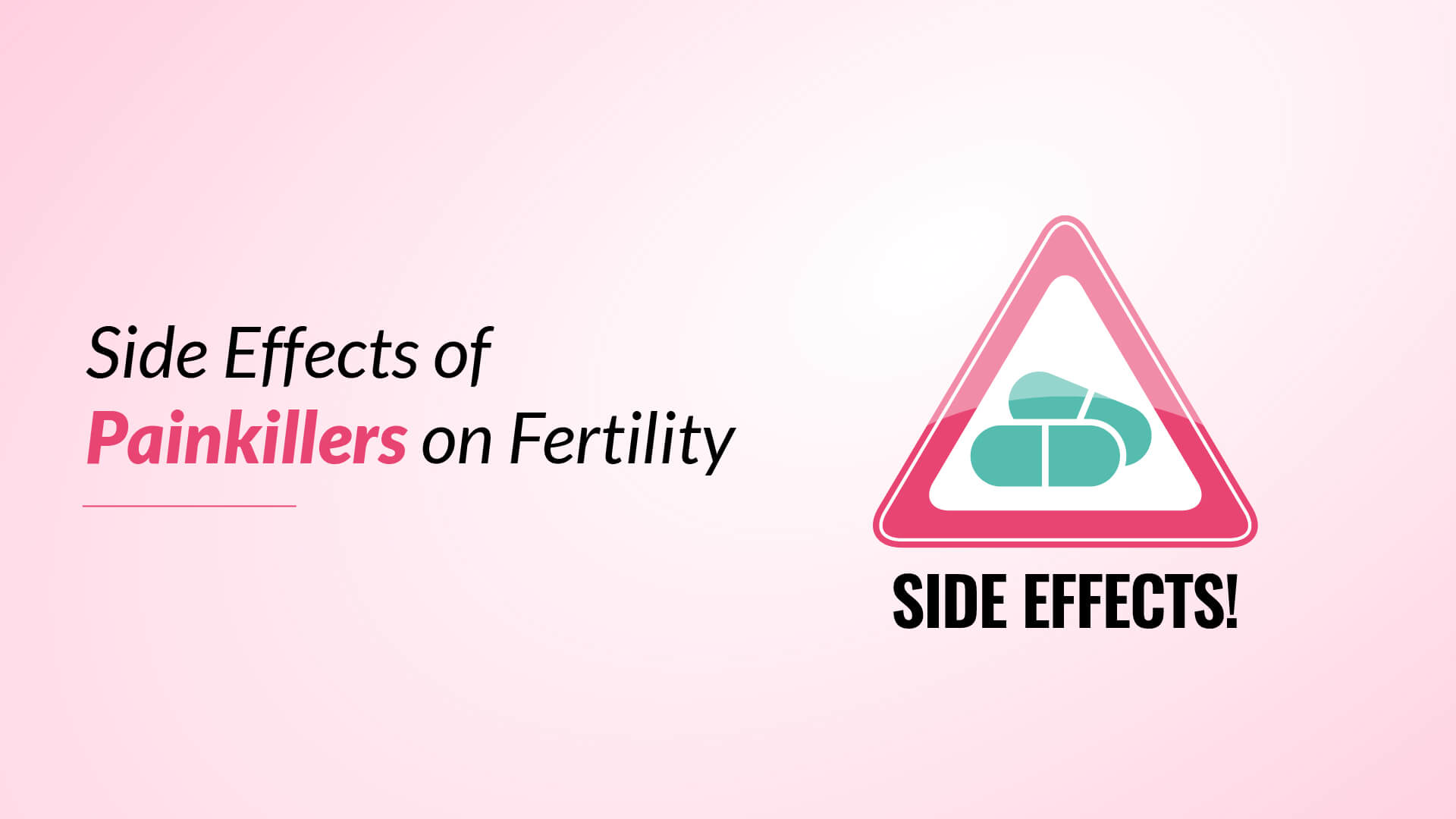Side effects of painkillers on fertility
Reviewed By: Dr. Anusha Kushanapally, fertility specialist at Ferty9 Fertility Clinic, Warangal
Pain is a universal experience, and many individuals rely on painkillers to alleviate discomfort from various conditions. However, while these medications provide relief, they can also have unintended consequences on fertility. Understanding the potential effect of different types of painkillers on reproductive health is crucial for individuals who are trying to get pregnant or maintain their fertility.
Related read: Yoga to Get Pregnant: What to Expect
Types of Painkillers
Non-steroidal Anti-inflammatory Drugs (NSAIDs):
These drugs are a group of medicines commonly used to reduce inflammation, fever, and pain. Examples include ibuprofen, aspirin, and naproxen. NSAIDs work by hindering the production of prostaglandins (PGs), which are involved in the inflammatory response.
Acetaminophen (Paracetamol)
Acetaminophen, also known as paracetamol, is a widely used over-the-counter pain reliever and fever reducer. It works by intervening in the production of prostaglandins in the brain, but unlike NSAIDs, it does not have a significant anti-inflammatory effect.
Opioids
Opioids, such as morphine, codeine, and oxycodone, are potent pain reducers prescribed for moderate to severe pain. They bind to specific receptors (opioid receptors) in the brain and spinal cord, diminishing the pain perception. Opioids are highly addictive and have a range of adverse effects, including constipation, respiratory depression, and sedation.
Impact of NSAIDs on Fertility
Prostaglandin Inhibition
NSAIDs suppress the production of prostaglandins, which play a crucial role in ovulation and implantation. This inhibition can potentially disrupt the ovulatory process and impair fertility.
Hormonal Disruption
Some studies suggest that NSAIDs may interfere with the production and regulation of various hormones involved in the menstrual cycle, such as progesterone and oestrogen. This hormonal fluctuation can result in irregular menstrual cycles and potentially impact fertility.
Disruption of Ovulation
Research has shown that prolonged use of NSAIDs can delay or prevent ovulation in some women. This effect is particularly concerning for individuals trying to conceive, as ovulation is essential for pregnancy.
Also read: Natural Ways to Increase Ovulation
Effects on Menstrual Cycle
NSAIDs can alter the length and regularity of menstruation, which can make it more challenging to pinpoint the fertile window and increase the risk of anovulatory cycles (cycles without ovulation).
Impact of Acetaminophen on Fertility
Impact on Pregnancy
While acetaminophen is generally considered safer than NSAIDs during pregnancy, some studies have stated a potential link between prolonged use of acetaminophen and an increased risk of certain congenital disabilities, such as autism spectrum disorder (ASD) and attention deficit hyperactivity disorder (ADHD). However, more research is needed to establish a causal relationship.
Effect on Ovarian Reserve
Ovarian reserve indicates the number and quality of eggs a woman has remaining. Some research suggests that long-term use of acetaminophen may be associated with a reduced ovarian reserve, potentially affecting fertility.
Potential for Altered Menstrual Cycles
Like NSAIDs, acetaminophen may also impact the regularity and length of menstrual cycles, which can make it more difficult to predict ovulation and the fertile window.
Impact on Uterine Health
There is limited research on the potential effects of acetaminophen on uterine health and implantation. However, some studies have suggested that excessive use of acetaminophen during pregnancy may increase the risk of certain pregnancy complications, such as low birth weight or preterm birth.
Impact of Opioids on Reproductive Health
Sperm Production
Opioid use has been linked to reduced sperm production and quality in men. This effect may be due to the suppression of hormones involved in sperm production, such as testosterone and luteinising hormone (LH).
Testosterone Levels
Opioid medicines use can lead to a decrease in testosterone levels, which can negatively impact male fertility, libido, and sexual function.
Sexual Function and Libido
In addition to hormonal effects, opioids can also directly impact sexual function and libido in both men and women. This can make it more difficult to conceive and maintain a healthy sexual relationship.
Long-Term Reproductive Health Risks
Chronic opioid use has been linked with an increased risk of reproductive health issues, such as menstrual irregularities, infertility, and pregnancy complications. Additionally, opioid use during pregnancy can lead to neonatal abstinence syndrome (NAS) in newborns, which can have long-term developmental consequences.
Alternative Pain Relief Methods
If you are trying to conceive or are concerned about the impact of painkillers on your fertility, consider exploring alternative pain relief methods. These may include:
- Physical therapy and exercise
- Heat or cold therapy
- Acupuncture
- Massage therapy
- Mindfulness and relaxation techniques
- Dietary changes and supplements (after consulting with a doctor)
It's important to discuss your concerns with your doctor and explore safe and effective pain management strategies that align with your fertility goals.
Find Hope and Solutions for Female Infertility and Male Infertility — Explore Our Comprehensive Services
IVF Treatment
IUI Treatment
ICSI Treatment
PICSI Treatment
Fertility Preservation Service
Blastocyst Culture & Transfer Treatment
Genetic Screening & Testing
Conclusion
Painkillers, while effective in managing pain and discomfort, can have potential impacts on fertility and reproductive health. NSAIDs, acetaminophen, and opioids have been associated with various effects, including disruption of ovulation, hormonal imbalances, and effects on sperm production and quality. It is crucial to weigh the risks and advantages of using these medications, especially for individuals trying to conceive or maintain their fertility.
If you are concerned about the potential effects of painkillers on your fertility, it is recommended to consult with a doctor. They can provide personalised guidance and explore alternative pain management approaches that may be more suitable for your individual needs and fertility goals.
Visit Our Clinic:
Fertility Clinic in Hyderabad
Fertility Clinic in Visakhapatnam
Fertility Clinic in Vijayawada
Fertility Clinic in Karimnagar
Fertility Clinic in Rajahmundry
Fertility Clinic in Tirupati
Fertility Clinic in Kurnool

Write your message


